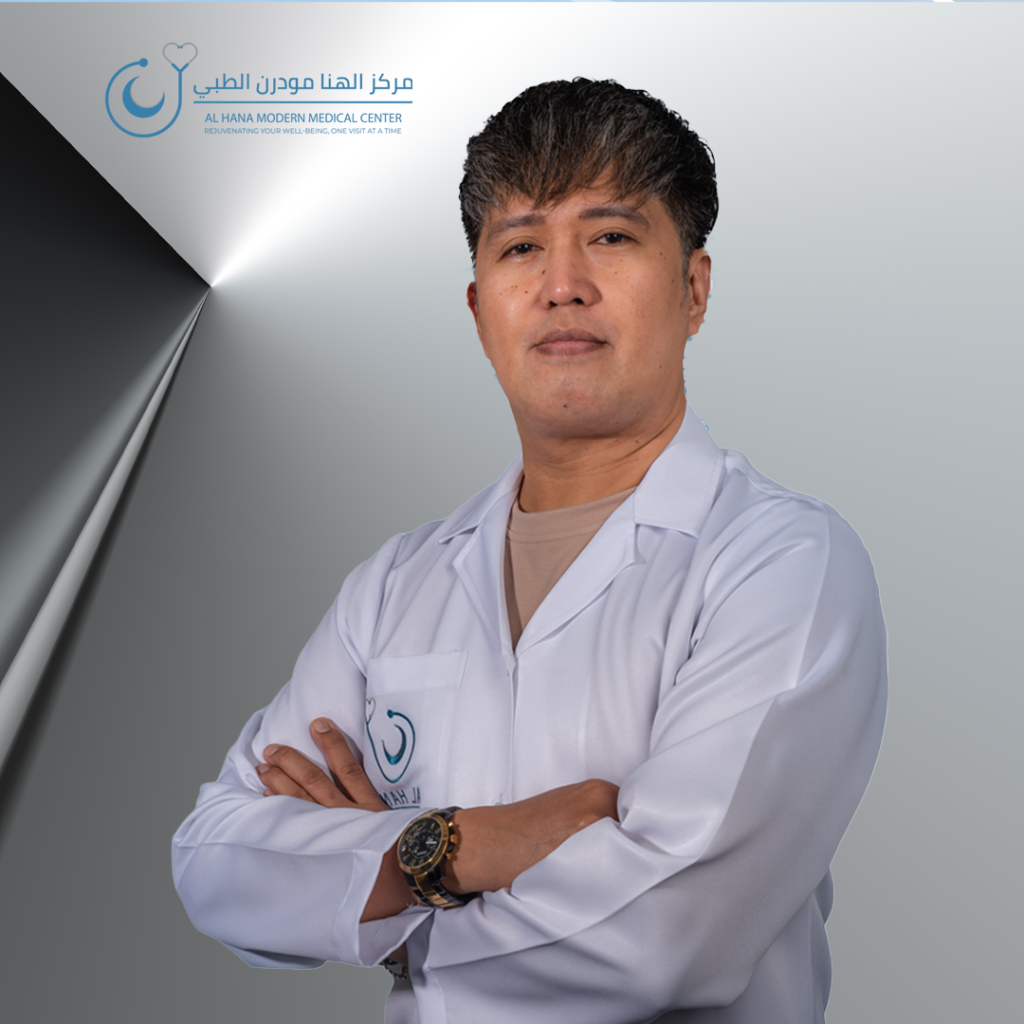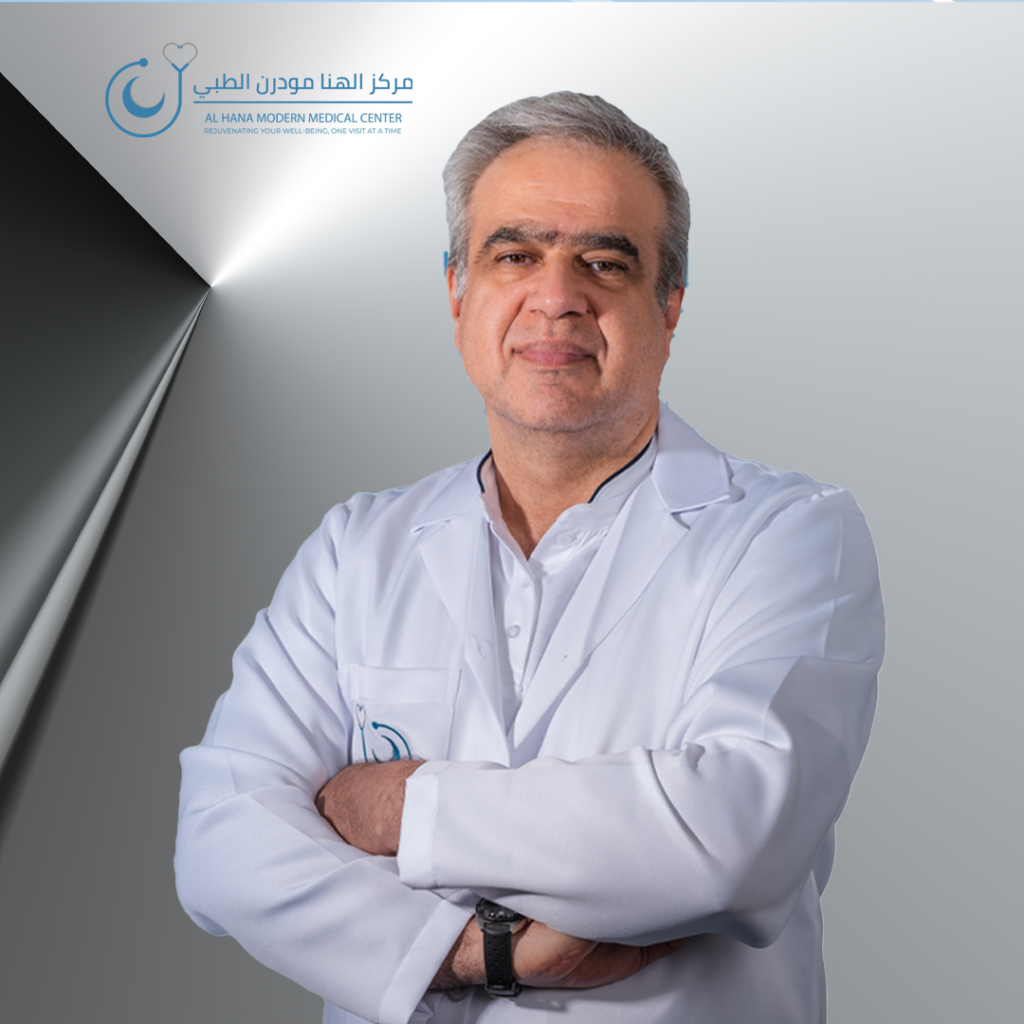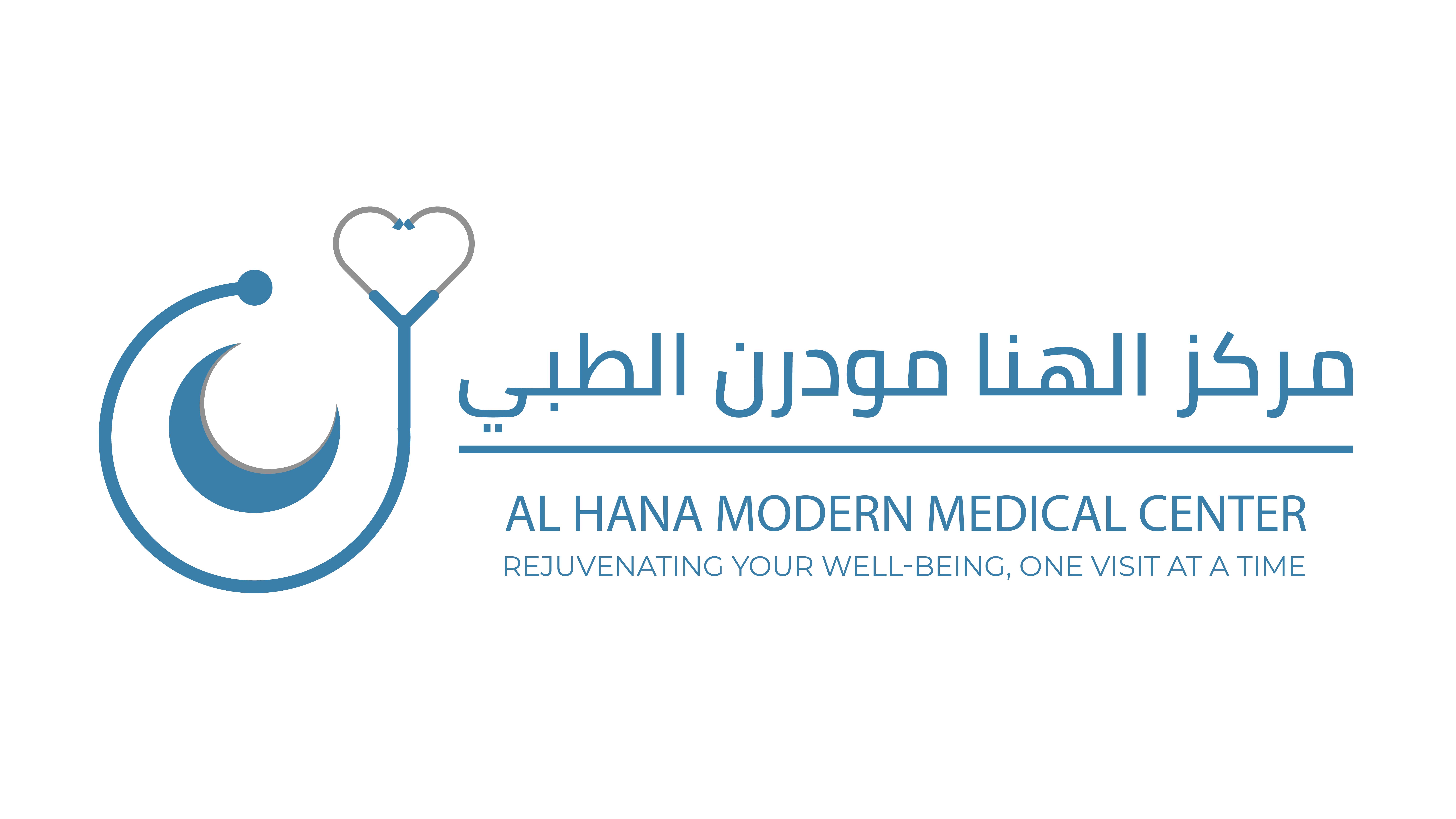Teeth Crown
Dental Crown
A dental crown is a dental restoration used to repair and protect a damaged or weakened tooth. It is a tooth-shaped cap that is custom-made to fit over the affected tooth, covering it entirely above the gumline. Dental crowns are commonly made from materials like porcelain, ceramic, metal, or a combination of materials, depending on the specific dental needs and preferences of the patient.
The dental crown procedure typically involves two visits to the dentist. During the first visit, the dentist examines the tooth and prepares it by removing any decay or old fillings. The tooth is then reshaped to create a suitable foundation for the crown. An impression of the prepared tooth and surrounding teeth is taken and sent to a dental laboratory, where skilled technicians craft the custom crown to ensure a precise fit and natural appearance.
In the second visit, the permanent crown is placed and bonded securely onto the tooth using dental cement. The dental crown functions like a natural tooth, providing strength and protection to the damaged tooth. It also improves the tooth’s aesthetics, restoring a natural and healthy-looking smile. With proper oral hygiene and regular dental check-ups, dental crowns can last for many years, making them a durable and effective solution for dental restoration. If you have a damaged tooth, consult your dentist to determine if tooth crown is the right treatment option for you.
Al Hana Modern Medical Center in Dubai offers a wide range of dental services, including dental crown placements. As a reputable and advanced medical center, Al Hana aims to provide top-quality dental care using the latest technology and skilled dental professionals.
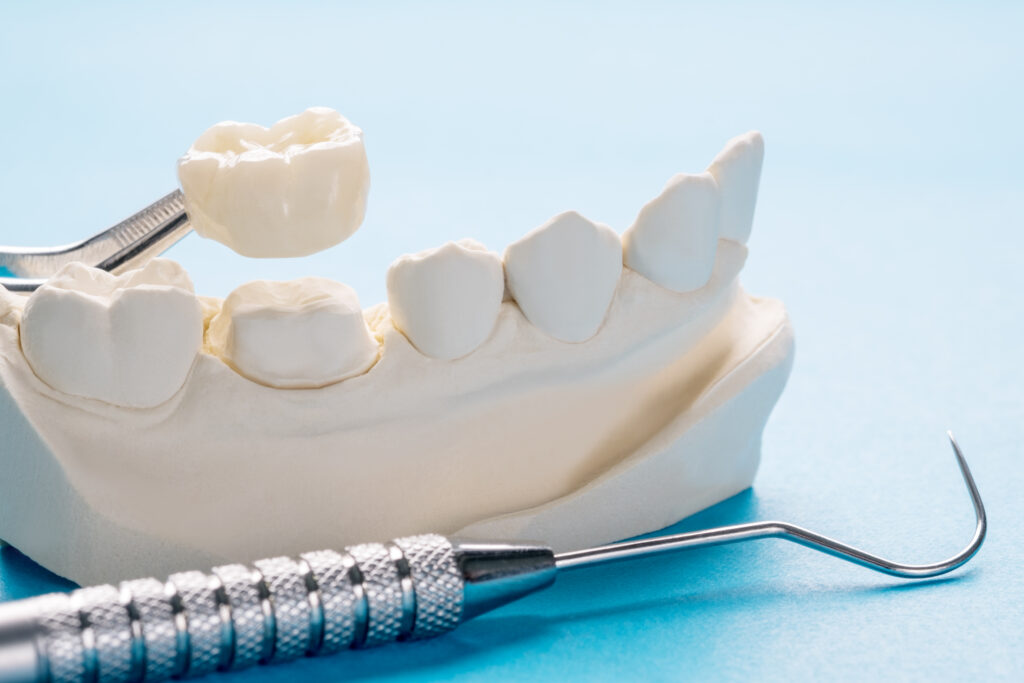
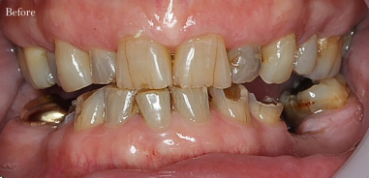
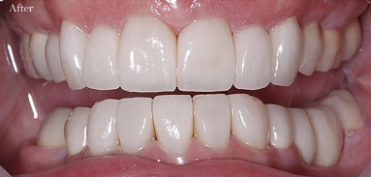
Types of Dental Crowns:
Porcelain Crowns: These crowns are crafted from porcelain, which closely resembles the appearance of natural teeth. They are an excellent choice for front teeth or other visible areas of the mouth due to their aesthetic appeal.
Ceramic Crowns: Similar to porcelain crowns, ceramic crowns provide natural aesthetics and are often preferred for their lifelike appearance.
Metal Crowns: These crowns are made from different metals like gold, silver, or alloys. They are highly durable and can withstand significant biting forces, making them suitable for molars and teeth that endure heavy chewing.
Porcelain-Fused-to-Metal (PFM) Crowns: PFM crowns combine the strength of metal with the aesthetics of porcelain. They have a metal substructure for support with a porcelain layer covering the visible part, providing both durability and a natural appearance.
Zirconia Crowns: Zirconia crowns are known for their strength and resistance to chipping or cracking. They offer excellent aesthetics and are often used for both front and back teeth.
Reasons for Dental Crown Placement:
Dental crowns are used in various situations to address different dental issues, including:
- Extensive Tooth Decay: When a tooth has a large cavity that cannot be effectively restored with a filling, a crown may be recommended to strengthen the tooth and protect it from further damage.
- Broken or Fractured Teeth: Tooth crown can hold together parts of a fractured tooth, preventing further cracks and restoring its function.
- Root Canal Treatment: After a root canal procedure, the tooth may become weak and brittle. Placing a crown over the treated tooth can protect it and restore its functionality.
- Cosmetic Enhancements: Dental crowns can be used for cosmetic purposes, such as covering severely discolored or misshapen teeth, resulting in a more aesthetically pleasing smile.
- Tooth Wear: In cases of severe tooth wear due to grinding or erosion, Crowns can rebuild and strengthen the affected teeth.
The Dental Crown Procedure:
The process of getting a dental crown typically involves two visits to the dentist:
Tooth Preparation: In the first visit, the dentist will prepare the affected tooth by removing any decay or old filling material. The tooth is then shaped to accommodate the crown, ensuring a proper fit.
Impression and Temporary Crown: After tooth preparation, the dentist takes an impression of the prepared tooth and the surrounding teeth. This impression is sent to a dental laboratory, where skilled technicians create a custom crown. While waiting for the permanent crown to be fabricated, a temporary crown is placed over the prepared tooth to protect it.
Permanent Crown Placement: In the second visit, the temporary crown is removed, and the dentist places the custom-made permanent crown. Before bonding it in place, the dentist ensures that the fit and appearance are satisfactory. Once the crown is securely positioned, it becomes a permanent part of the tooth.
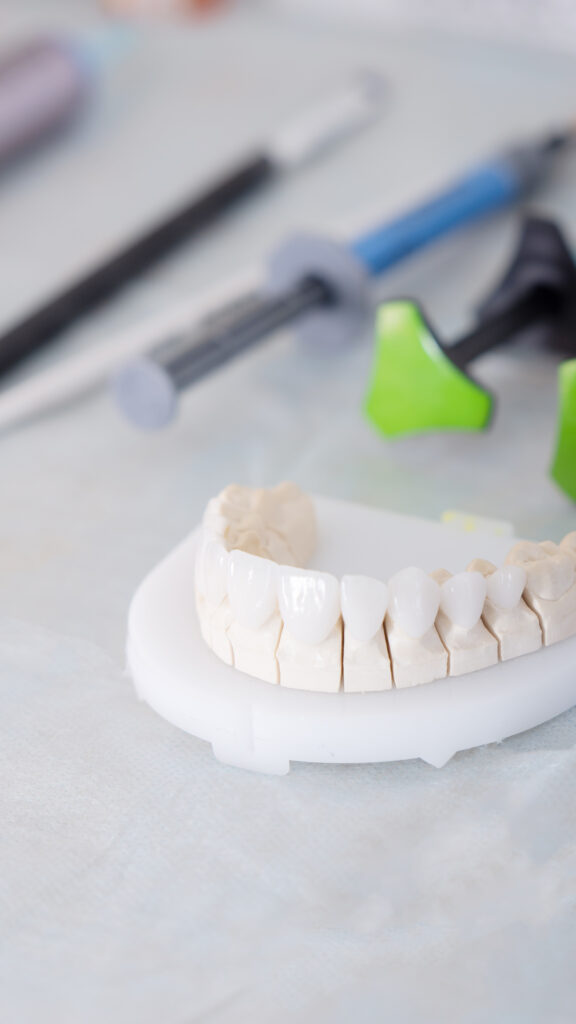
Teeth crown is used to restore and protect a damaged or weakened tooth, providing strength and improving its appearance.
The longevity of dental crowns depends on various factors, including oral hygiene practices, biting forces, and the material used. On average, dental crowns can last between 10 to 15 years or even longer with proper care.
Dental crown procedure is usually not painful, as local anesthesia is used to numb the area during tooth preparation and crown placement. Patients may experience some mild discomfort after the procedure, which typically subsides within a few days.
In some cases, dental fillings or dental veneers may be viable alternatives to crowns, depending on the extent of tooth damage and the desired outcome.
Dental crowns are custom-made in a dental laboratory. Impressions of the prepared tooth and surrounding teeth are taken, and skilled technicians craft the crown to ensure a precise fit and natural appearance.
Yes, you can eat normally with a dental crown. Dental crowns are designed to withstand regular biting and chewing forces. However, it is best to avoid extremely hard or sticky foods that may damage the crown.
Dental crowns require regular oral hygiene care, including brushing, flossing, and regular dental check-ups. Avoiding habits like teeth grinding and using teeth as tools can also help prolong the life of the crown.
Crowns cannot be whitened with traditional teeth whitening methods. If the crown becomes stained or discolored over time, it may need to be replaced or repaired.
While dental crowns are generally safe, some patients may experience sensitivity or mild discomfort after the procedure. In rare cases, complications such as allergic reactions to crown materials may occur.
The cost of tooth crown varies depending on factors such as the material used, the complexity of the case, and the dentist’s location. Dental insurance may cover a portion of the cost, but it is best to check with your provider to understand your coverage. At Al Hana Modern Medical Center we are providing tooth crown starting from 500 AED. It depends which type of crown you prefer to place.


